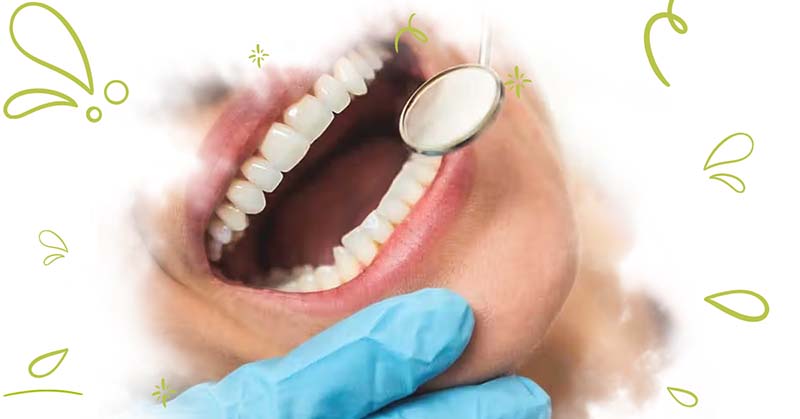Dental Health Care
Enamel Erosion: Causes, Signs, Restoration, and Prevention
Do you feel sensitivity or discomfort when consuming hot or cold foods? This might be due to enamel erosion. Although enamel plays a crucial role in protecting the inner part of the teeth, it is prone to damage if not cared for properly. So, what is enamel erosion? What are its causes and treatments? Let’s ePortfoliohub.ie explore these questions in the following article.

1. What is Enamel Erosion?
Enamel is the outermost layer that protects the dentin inside the teeth. With its thin and durable characteristics, enamel can withstand chewing, biting, and grinding actions for a long time.
However, if not taken care of properly, this enamel layer can wear down, exposing the dentin and losing its protective capability, leading to pain and sensitivity around the teeth. This is known as enamel erosion.

Enamel erosion can be classified into four types:
- Physiological Erosion: This is the natural wear of enamel due to friction between opposing teeth. Typically, the chewing surfaces are worn down first, followed by the lower and upper tooth cusps.
- Chemical Erosion: This occurs when enamel is exposed to acids from fruit juices or stomach acids. This type of enamel erosion can cause dental issues ranging from mild discoloration to severe tooth loss.
- Pathological Erosion: This refers to the loss of enamel due to friction between teeth or external impacts such as brushing too hard or biting hard objects.
- Cervical Abrasion: This type of enamel erosion is caused by improper brushing techniques over time, leading to the wear of the enamel at the neck of the tooth.
2. Causes of Enamel Erosion
Enamel erosion can stem from various lifestyle habits and health-related factors:

2.1. Daily Habits
Certain dietary and lifestyle habits can affect enamel, such as:
- Consuming foods high in starch, sugar, and acid like candies, soda, and citrus juices.
- Improper brushing techniques, teeth grinding, or using teeth to bite hard objects.
- Not cleaning teeth properly after meals.
- Using certain medications long-term, like Aspirin and Histamine, which can cause enamel erosion.
- Receiving dental treatments from low-quality clinics, which can damage the enamel during procedures.
2.2. Health Conditions
Gastrointestinal issues such as gastroesophageal reflux disease (GERD) can cause stomach acid to reach the mouth, gradually eroding the teeth. Additionally, dental diseases such as cavities and periodontitis can promote bacterial growth and enamel wear.
2.3. Internal Factors
Some internal body factors can contribute to enamel erosion, such as:
- Reduced saliva production, leading to dry mouth and inability to neutralize acids on enamel.
- Premature birth and nutritional deficiencies can result in incomplete enamel formation.
3. Signs of Enamel Erosion
To identify whether your enamel is eroding, look for these five signs:
- Tooth Discoloration: Teeth turn a yellowish hue, which is the color of exposed dentin. Teeth may also become stained and less aesthetically pleasing.
- Increased Sensitivity: Experiencing sensitivity or dull pain when consuming hot, cold, or acidic foods.
- Smooth or Indented Tooth Surfaces: Loss of minerals can make the tooth surface smooth and indented.
- Cracks and Chips: Teeth develop cracks, and the edges become rough.
- Increased Cavity Risk: Small cavities appear, which can grow larger and penetrate deeper into the dentin if not treated promptly.

4. Best Ways to Restore Strong Enamel
Symptoms of enamel erosion significantly impact the quality of life and increase the risk of dental diseases. As the body cannot regenerate lost enamel, it’s essential to visit a reputable dental clinic for examination, diagnosis, and appropriate treatment.
Alongside professional care, individuals should adopt proper dental care habits to prevent enamel erosion:
- Proper Oral Hygiene: Brush teeth twice daily, use dental floss and mouthwash, avoid brushing too hard, and use a circular motion while brushing.
- Increase Mineral Intake: Strengthen teeth by consuming vitamin D and calcium through natural foods or supplements. Also, limit consumption of tough, hard foods, and acidic sweets and fruits like oranges.
- Regular Dental Cleanings: Visit the dentist every six months for check-ups and tartar removal. This helps in early detection and timely treatment of dental issues.
Depending on the extent of enamel loss, dentists may recommend methods such as:
- Fluoride Application: Reduces enamel loss, prevents cavities, and prolongs the effectiveness of other restorative materials.
- Tooth Filling: Fixes cavities and prevents bacteria from further penetrating the dentin.
- Veneer Bonding: Attaches veneers to the tooth surface, covering indentations or chips and preventing further enamel erosion.
- Dental Crowns: Suitable for significant enamel loss, crowns help prevent additional enamel wear and cavity formation.

5. Solutions to Prevent Enamel Erosion
Apart from lifestyle habits and health conditions, natural enamel erosion occurs over time. To minimize enamel erosion, consider these tips:
- Choose toothpaste containing fluoride.
- After consuming acidic foods or drinks, wait about an hour before brushing your teeth to allow enamel to reabsorb minerals.
- Use a straw when drinking acidic beverages and rinse your mouth afterward.
- Drink more water if you have dry mouth or reduced saliva production.
- Limit snacking to times when you can rinse your mouth afterward.
- Chew sugar-free gum between meals.
- Schedule regular dental check-ups every six months.
In summary, enamel erosion is a common issue, primarily due to improper dietary and lifestyle habits. Therefore, pay extra attention to dental care and schedule regular dental visits. If you notice signs of enamel erosion, consult a dentist promptly for suitable treatment advice.
